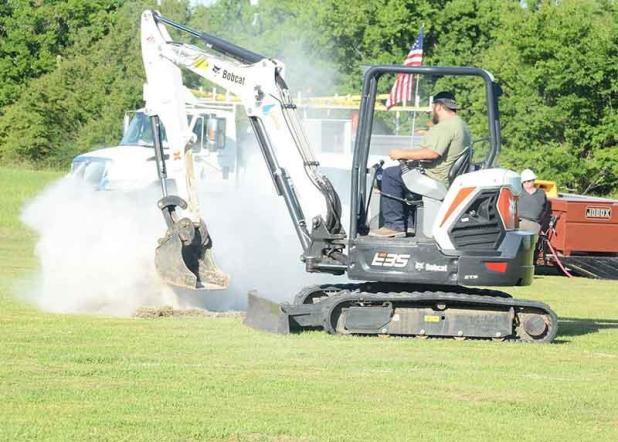
Compressed air is released to simulate the rupture of a natural gas pipeline during a drill Thursday in Houma. A participant in the drill uses an excavator to show the improper way to dig without checking for underground pipelines or utility lines. (The Daily Review/Zachary Fitzgerald)
Drill simulates pipeline rupture
Pipeline safety is of critical importance in many areas in the United States, and south Louisiana is no exception.
Attendees to a Thursday drill got a first-hand look at what could happen when workers don’t follow proper procedures when planning to dig.
Officials held a mock natural gas pipeline rupture drill outside of The Event Center in Houma.
Enertech, a public safety and awareness organization, hosted the event in conjunction with other companies, agencies and first responders.
Participants in the drill first demonstrated the correct way to check for underground pipelines or utility lines before digging. They then went through a scenario where workers didn’t go through the proper process to check for lines, which resulted in a burst pipeline. Compressed air was used to simulate natural gas being released during a pipeline break.
The event was sponsored by area pipeline operators and Louisiana One Call, a non-profit organization that excavators are required to call before digging to learn of any underground hazards in the vicinity.
Anyone planning to do any excavation project should call 811 before digging to avoid hitting pipelines or utility lines, said Greg Kittle, liaison program manager for Enertech.
Kittle travels to different states facilitating these types of events.
“It’s just a way of showing the public what can happen if you don’t follow safe excavating procedures, how resource-intensive everything can be,” Kittle said.
Brent Saltzman, damage prevention manager for Louisiana One Call, said, under Louisiana law, “anything that causes movement or removal of earth in the state of Louisiana requires a one-call ticket.”
Louisiana One Call provides its service free of charge and receives funds through fees collected when the organization notifies a pipeline operator that a line needs to be marked.
By law, excavators must wait at least two business days after calling 811 before beginning to dig in order to allow officials to mark all the underground lines or determine no lines are in the vicinity, Saltzman said.
Mechanized equipment, such as a backhoe, may not be used within “the tolerant zone,” which is 18 inches from the edge of an underground line, Saltzman said.
If someone does hit a pipeline, the person should immediately go upwind of the hazardous material, call 911 and then call the owner or operator of the pipeline, Saltzman said.
Every nine minutes in the United States an underground utility line or pipeline is damaged “because someone didn’t call 811 first,” Saltzman said.
Workers should use white lines and flags to mark a proposed excavation area, said Cole Vanderlick, Enertech’s Louisiana liaison manager.
Line locators use yellow lines and flags to mark natural gas, oil, petroleum and steam products. Electric lines are marked in red. Blue represents potable water, and orange signifies communication lines. Green shows sewer and drain lines, and purple is reclaimed water and irrigation pipes. Pink shows a “temporary survey,” Vanderlick said.
The Houma fire and police departments and Acadian Ambulance participated in the drill. Other partners were Atmos Energy, CenterPoint Energy, Crimson Gulf LLC, EnLink Midstream, ExxonMobil, Kinetica Partners LLC, Plains All American Pipeline, Pierre Part Natural Gas and South Coast Gas.
A representative from the Department of Natural Resources’ pipeline safety division was in attendance as well.
